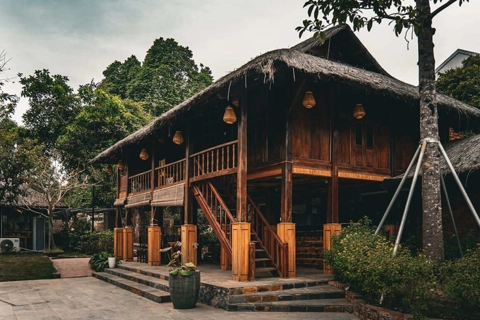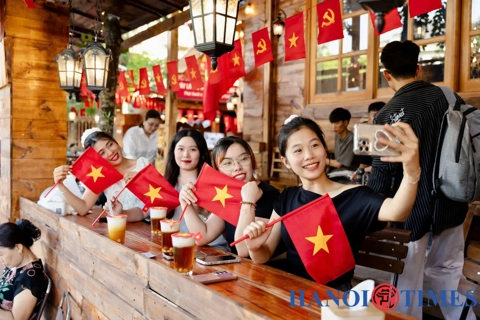Travel
How should investors prepare for homestay race in Vietnam?
Jun 28, 2019 / 08:51 AM
Rising demand for homestay in Vietnam enables investors to consider investment portfolio.
Homestay is seeing rising demand in Vietnam and the way it flourishes largely generates investment from both domestic and foreign investors.
Before taking a well-prepared process for the investment, let’s explore how magnetic this segment brings about.
Homestay, which is a popular form of hospitality and lodging whereby visitors sleep at the residence of a local of the city to which they are traveling, has become an optional in the context that hotels have been less affected by online home-sharing platforms than expected.
The situation becomes more trendable in Vietnam where hotel supply is not yet sufficient to cater for the growing number of tourists at peak seasons, according to JLL.
In the country which is labeled a destination for many kinds of tourism with diverse products regarding mountain, sea, hometown, city, adventurous, natural and cultural heritages, offering new alternatives to travelers results in new opportunities to invest, no matter how much capital or asset investors possess.
Homestay properties are usually located in big cities with high tourism demand like Ho Chi Minh City, Hanoi, Da Lat, Nha Trang, Sa Pa, among others. US-based Airbnb in particular now supplies more than 16,000 units for Vietnam’s market, JLL said in the latest report, quoted Grant Thornton’s Hotel Survey 2017 report.
Notably, this model offers much larger spaces through offerings that include entire villas, houses, apartments and bungalows, which can accommodate a larger number of guests than hotel rooms.
It can be said that Airbnb is creating an additional hospitality market by offering new alternatives to travelers and attracting a new generation of guests, particularly millennials, who represent an increasing portion of travelers that are constantly seeking new experiences, JLL added.
This type of short-term rental model starts out as a platform for people to rent out their unused space, anytime they want. Home-owners with spare rooms in their house can rack in considerable additional leisure income, even if they only rent out their property every weekend or so.
The attractive income has inspired many investors in Vietnam to invest in buy-to-let, or take a long-term lease to rent the property back.
However, many has found that the total they make a month were not able to cover their mortgage or interest.
Therefore, before deciding to invest your capital and become a host, there are a few things to get right, JLL has warned.
Location is a major factor. If you are focusing on short-term rental services, pick a property near touristy areas or the airports. How the property connects to nearby traffic and facilities is also a major concern, in addition to convenience stores or food courts.
Management cannot be overlooked. Managing several listing at a time can be tiring, especially if the investor is doing this on the side of their main job. Oversight in management can lead to serious security problems, property and reputation damage. Hiring experienced staff is probably the best solutions for management issues, but quality human resource can rake up operation cost, which can easily eat away profits.
Don’t forget the experience. Before listing, think about what your home can offer guests compared to traditional hotels at the same price. Many homestay investors consider “local touch” + “competitive price” the golden formula for success. The majority of guests who choose homestays over hotels tend to expect a certain flavor of the local area in their rented property, anything from having “Ca phe sua da” drip filter in the kitchen to “Non la-shaped lamps” can differentiate your property from competitors.
Finally, investors must be aware of the business registration procedures necessary for this model to ensure sustainable and smooth business operation.
When there is more and more residential supply, it is more difficult to rent out apartments with long-term contracts. Short-term rental model can be a solution for this problem, JLL emphasized.
On global prestigious tourism pages, Vietnam’s northwest, Red River Delta, Mekong River Delta are destinations offering unique homestay models.

Photo: North-vietnam.com
|
Homestay, which is a popular form of hospitality and lodging whereby visitors sleep at the residence of a local of the city to which they are traveling, has become an optional in the context that hotels have been less affected by online home-sharing platforms than expected.
The situation becomes more trendable in Vietnam where hotel supply is not yet sufficient to cater for the growing number of tourists at peak seasons, according to JLL.
In the country which is labeled a destination for many kinds of tourism with diverse products regarding mountain, sea, hometown, city, adventurous, natural and cultural heritages, offering new alternatives to travelers results in new opportunities to invest, no matter how much capital or asset investors possess.
Homestay properties are usually located in big cities with high tourism demand like Ho Chi Minh City, Hanoi, Da Lat, Nha Trang, Sa Pa, among others. US-based Airbnb in particular now supplies more than 16,000 units for Vietnam’s market, JLL said in the latest report, quoted Grant Thornton’s Hotel Survey 2017 report.
Notably, this model offers much larger spaces through offerings that include entire villas, houses, apartments and bungalows, which can accommodate a larger number of guests than hotel rooms.
It can be said that Airbnb is creating an additional hospitality market by offering new alternatives to travelers and attracting a new generation of guests, particularly millennials, who represent an increasing portion of travelers that are constantly seeking new experiences, JLL added.
This type of short-term rental model starts out as a platform for people to rent out their unused space, anytime they want. Home-owners with spare rooms in their house can rack in considerable additional leisure income, even if they only rent out their property every weekend or so.
The attractive income has inspired many investors in Vietnam to invest in buy-to-let, or take a long-term lease to rent the property back.
However, many has found that the total they make a month were not able to cover their mortgage or interest.
Therefore, before deciding to invest your capital and become a host, there are a few things to get right, JLL has warned.

Illustrative photo
|
Management cannot be overlooked. Managing several listing at a time can be tiring, especially if the investor is doing this on the side of their main job. Oversight in management can lead to serious security problems, property and reputation damage. Hiring experienced staff is probably the best solutions for management issues, but quality human resource can rake up operation cost, which can easily eat away profits.
Don’t forget the experience. Before listing, think about what your home can offer guests compared to traditional hotels at the same price. Many homestay investors consider “local touch” + “competitive price” the golden formula for success. The majority of guests who choose homestays over hotels tend to expect a certain flavor of the local area in their rented property, anything from having “Ca phe sua da” drip filter in the kitchen to “Non la-shaped lamps” can differentiate your property from competitors.
Finally, investors must be aware of the business registration procedures necessary for this model to ensure sustainable and smooth business operation.
When there is more and more residential supply, it is more difficult to rent out apartments with long-term contracts. Short-term rental model can be a solution for this problem, JLL emphasized.
On global prestigious tourism pages, Vietnam’s northwest, Red River Delta, Mekong River Delta are destinations offering unique homestay models.








